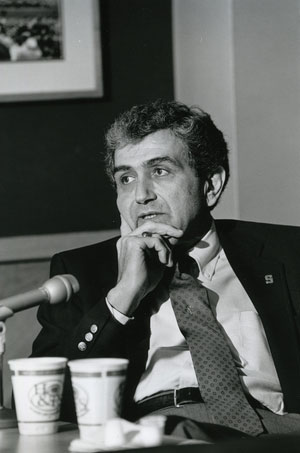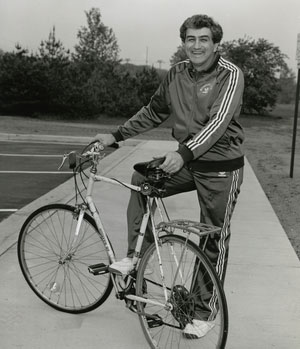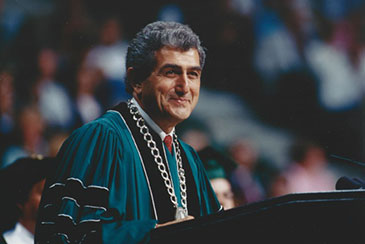Legacy

John DiBiaggio, Michigan State University’s 17th president, who served from 1985 to 1992, died Feb. 1, 2020, at the age of 87.
DiBiaggio grew up in Detroit and was the first in his family to attend college. Little did he know, he would later become a three-time university president, serving at the University of Connecticut, Michigan State University and Tufts University in Massachusetts.
Many higher education and national leaders described DiBiaggio in the same way: A leader in higher education, service to community and a champion for excellence, ethical decision-making and high professional standards.
“John DiBiaggio was a true advocate for inclusion, service to others and, most of all, equitable access to higher education," said MSU President Samuel L. Stanley Jr., M.D. "His legacy is still felt on the banks of our Red Cedar and will be for generations to come. Our most sincere condolences go out to his family during this difficult time.”
During his eight-year tenure at MSU, DiBiaggio achieved many firsts for the university and worked to advance its land-grant mission as a tenacious advocate for education. He was known for his commitment to and promotion of diversity and inclusion, along with global scholarship and research. His passion for global understanding and support for international programs and study abroad moved MSU into the global educational forefront. He saw a land-grant university serving not only the state and the nation, but importantly, the world.
 In 1987, DiBiaggio initiated the university’s first major capital campaign, raising more than $217 million in an effort to offset the forthcoming shortfalls in state funding for higher education. Among the many gifts to the university he secured was the naming gift for the Eli Broad College of Business, along with a multimillion-dollar gift for a materials research institute from the Herbert and Grace Dow Foundation. He rallied support from alumni and corporate leaders while sharing his compassion, magnetism and warmth with students, faculty, staff, trustees, donors and especially alumni to elicit a reconnection with the university that was unique and appreciated by many.
In 1987, DiBiaggio initiated the university’s first major capital campaign, raising more than $217 million in an effort to offset the forthcoming shortfalls in state funding for higher education. Among the many gifts to the university he secured was the naming gift for the Eli Broad College of Business, along with a multimillion-dollar gift for a materials research institute from the Herbert and Grace Dow Foundation. He rallied support from alumni and corporate leaders while sharing his compassion, magnetism and warmth with students, faculty, staff, trustees, donors and especially alumni to elicit a reconnection with the university that was unique and appreciated by many.
In 1989, he led the inauguration on campus of the K1200 Superconducting Cyclotron, the world’s highest-energy continuous beam accelerator and a precursor to the Facility for Rare Isotope Beams. He also oversaw the design and dedication of the Jack Breslin Student Events Center, now one of the most frequently used campus facilities, when it opened that year. During the design process, he worked to secure the funds to enclose the Breslin stairwells that were previously planned to be exposed to the outside elements.
DiBiaggio also watched the MSU Spartan football team win the Rose Bowl in 1988 — the same year he implemented new academic-related initiatives, including a computerized registration system for students and an integrative studies program as a new core curriculum. He also established MSU’s first in-house legal counsel.
An advocate of public education and higher education, DiBiaggio often spoke on the importance of land-grant universities and higher education in general, and the ability to transform the lives of students through community service and service-learning. He was a founder of the Michigan Campus Compact, a coalition of colleges and universities across Michigan committed to the civic responsibility of higher education. DiBiaggio was also a member of the Knight Commission on Intercollegiate Athletics, where he worked to promote reforms that supported and strengthened the educational mission of college sports. Additionally, he was a member of the NCAA Foundation Board.
 He continued his love of leading higher education institutions after leaving MSU in 1992, serving as president of Tufts University until 2001. At Tufts he again was a founding leader in academic service, creating the University College of Citizenship and Public Service, now known as the Jonathan M. Tisch College of Civic Life led by Alan D. Solomont, a former ambassador to Spain and Andorra.
He continued his love of leading higher education institutions after leaving MSU in 1992, serving as president of Tufts University until 2001. At Tufts he again was a founding leader in academic service, creating the University College of Citizenship and Public Service, now known as the Jonathan M. Tisch College of Civic Life led by Alan D. Solomont, a former ambassador to Spain and Andorra.
Following his time as a higher education president, DiBiaggio shared his experiences as a highly respected and sought-after adviser to other college presidents and executive directors of higher education associations. He was highly regarded for his understanding of issues that competed for a university president’s attention and its totality.
Furthermore, over all the years, President DiBiaggio served as mentor to several American Council on Education fellows, providing training and opportunity to a new generation of academic leaders. One, Deborah Winslow Nutter, now senior associate dean at the Fletcher School of Law and Diplomacy at Tufts University, recalled DiBiaggio was a serious, kind and thoughtful mentor, a wise judge of character, and a man of the highest integrity.
He also was nominated by Sen. John Kerry of Massachusetts and served two terms as a member of the University of Massachusetts Board of Trustees.
Throughout his lifetime, DiBiaggio was as vibrant, energetic and committed as he was at Michigan State. He had a commitment to service and excellence.

